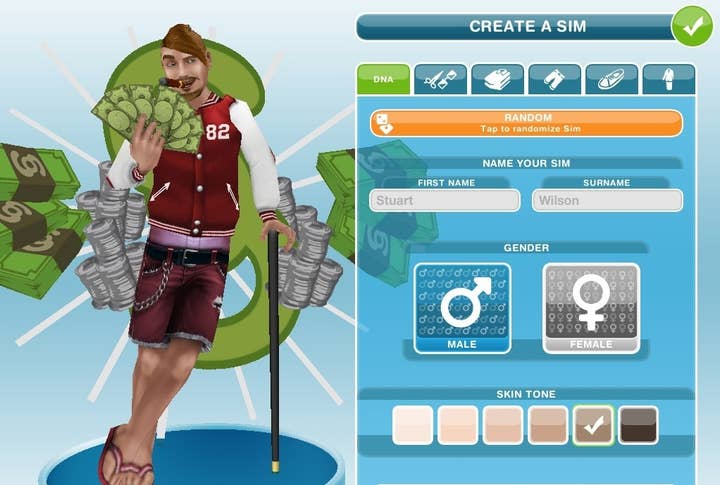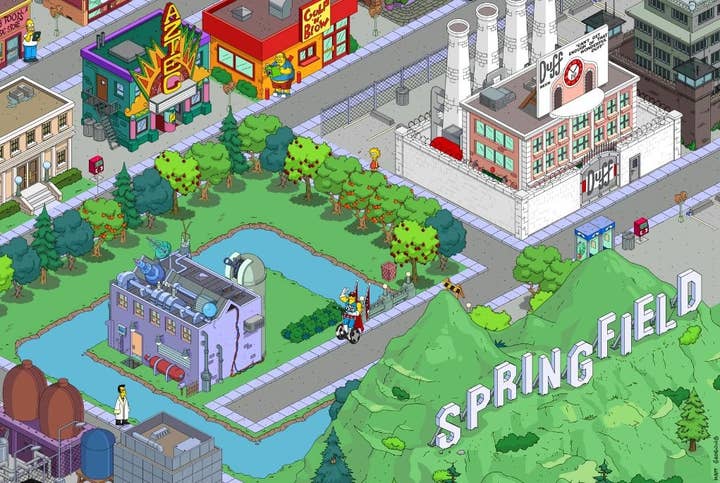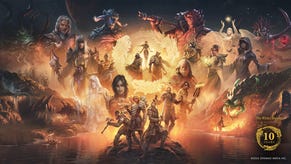EA Mobile doubles down on free-to-play
EA All Play's Nick Earl on the success of The Simpsons: Tapped Out and the future of the freemium model
Electronic Arts' mobile-focused All Play label saw out 2012 on a four-month high. After buckling under the weight of demand on its initial release, The Simpsons: Tapped Out relaunched on the iOS App Store in August, made a dash for the upper reaches of the top-grossing charts, and has since refused to budge. In October, it was the highest grossing game in the world for four straight weeks, attracting 2.8 million DAUs at its peak, and rounding out the month with a Treehouse of Terror pack that was played by more people than watched the TV series' own Halloween special. It's in the top-grossing chart right now, in fact, sandwiched between Clash of Clans and Hay Day in third place.
Popcap's admirable back-catalogue aside, The Simpsons: Tapped Out is one of EA's most significant mobile hits since its very public transition to digital began. Other EA products can be found among the App Store's most lucrative games - FIFA Soccer 13 is in fifth place, for example - but Tapped Out is particularly important because it is free. According to Nick Earl, senior vice president and general manager of All Play, from here on the £2.99 being charged for FIFA will be a rarity.
"EA sees mobile as the tip of the spear, the key growth area for our digital strategy"
"EA sees mobile as the tip of the spear," Earl says, "the key growth area for our digital strategy.
"For the most part [it will be free-to-play]. There will be some exceptions here and there, where it just makes sense to offer a one-time paid download, but for all intents and purposes freemium is what we're doing going forward. From here, you'll really see freemium rule the day.
"Freemium games are really driving our direction from a business model perspective. We're huge believers in the model. Not only is it here to stay, it's also really going to power the spread of mobile devices."
Successes like All Play's Tapped Out and The Sims Free Play have strengthened that resolve. In relative terms, EA entered the mobile gaming market during its pre-history, acquiring Jamdat for $680 million several years before the existence of either iOS or the App Store. It was a lot of money back then, and it still sounds like a lot of money now, but it enabled EA to become what Earl terms "king of the hill" of premium priced mobile games. What we now know is that there was another, much bigger hill just beyond premium, and EA was slow in staking a new claim. According to Earl, that changed in 2012.

"We probably didn't anticipate the transition as well as we would have liked," he says. "We had such incredible infrastructure built around premium games, and we were very strong on feature phones. We were getting out games in that fashion to many, many millions of devices.
"It takes time for any big, established business to go through a change this profound. To speak candidly, we probably should have done the transition a little faster, but I will say now that we have fully transitioned. This is the focus for us going forward."
The broad strategy for EA's mobile content is similar to that introduced to guide its console projects: fewer, bigger, better. But not necessarily more original. When I ask Earl about what 'fewer, bigger, better' will mean for EA's mobile release slate, his answer arrives as a list of the most commercially viable IP available to the company: The Simpsons, Battlefield, The Sims, Tetris, Scrabble. When you're reaching out to more casual players who are swimming in easily accessible and largely similar options, a recognisable brand is still one of the few reliable tools for building an audience.
"The dollars are going towards these core games, and for EA that's hugely, hugely encouraging"
"We're really getting behind the big ones, and we're making sure we hit a high level of quality with deep feature sets," says Earl, roughly describing EA's formula for success on the App Store. "These games are a little bit like a TV show. You have to constantly create and distribute new content to the audience, so logistically you want to do less and you want to focus on making it good.
"This isn't about sending people from new game to new game to new game. It's about building really strong game brand experiences and regularly supplying content."
The underlying goal seems to be that rarest of things in mobile games: permanence, longevity. The average mobile gamer is seen as so fickle that many developers create ostensibly persistent products fully expecting them to be obsolete in a few months or less. Earl doesn't see this approach as particularly healthy, but so far there have been very few brands that can stand alongside Angry Birds as real mainstays of the mobile space. In that sense, the market is still wide open to a degree that hasn't existed with consoles for many years.

And high quality products with depth of experience will be more important in the coming year than ever before. After several years of John Carmack and various other soothsayers anticipating mobile devices more powerful than Xbox 360s, 2013 may offer a clearer understanding of just what that means for the games - through projects like Scattered Entertainment's The Drowning, which purports to be the mobile equivalent of a console blockbuster. Infinity Blade and its sequel pointed towards a large number of core gamers who are not the principal target of the overwhelming majority of mobile games. What they are given often feels compromised, and yet they are the most willing to pay for what they play. According to Early, the popularity of games like Clash of Clans and Rage of Bahamut can be taken as indicators of where the market is heading.
"The Freemium space really caters to gamers who are conditioned to pay, and they will spend a lot on these games"
"The dollars are going towards these core games, and for EA that's hugely, hugely encouraging, because this is our sweet-spot," he says. "Most of our expertise is around building experiences for that market... It's really welcome news that that's where the market is heading from a grossing perspective. There'll be growth in casual games, and I think we're well positioned there, too, but the strategy/RPG core gamer is also there in a big way, and they'll be spending more and more money and time on these games."
The time for premium pricing on mobile games may well be over already. The market is still young, and it will no doubt change and grow in the coming years, but for Earl it's a matter of "human psychology": something for free is always preferable to something you pay for, and once that line is crossed it will be difficult to go back. Indeed, Earl suspects that the most suitable market for premium games, the core, will be more enthusastic about freemium than anybody.
"The Freemium space really caters to gamers who are conditioned to pay," he says. "But the result of that is they really like the freemium model, and they will spend a lot on these games. I think it's going to be hard to move back to the one-time download price model.
"We're building our business, our infrastructure, our teams, our organisation and our culture around the freemium model."









